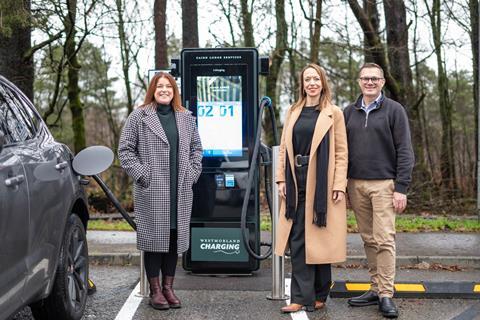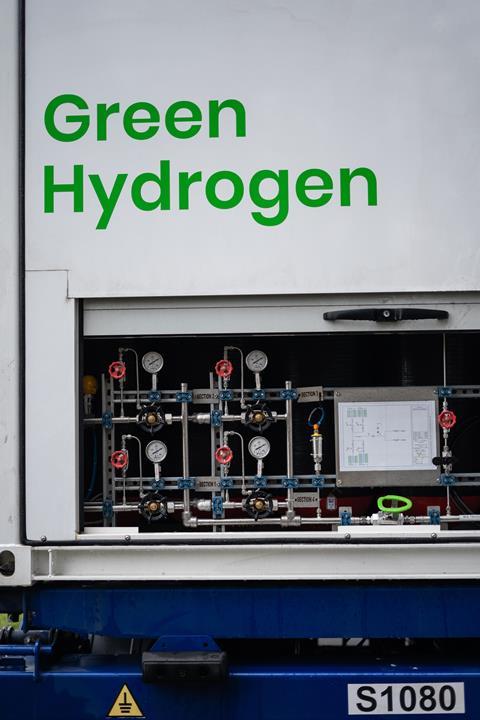
Forecourt retailers struggling to install or upgrade to faster electric vehicle (EV) chargepoints because of a lack of grid capacity now have access to a greener alternative than using traditional generators to make up the shortfall.
Operators who cannot source sufficient electricity from grid suppliers have until now largely relied on batteries and generators powered by diesel, bio diesel, or heavy gas oil to top up their provision.
But now green energy supplier GeoPura has launched what it says is a cleaner option, with the first hydrogen-powered electric vehicle chargepoints open to the public.
Cairn Lodge Services, on the M74, near Hamilton in Lanarkshire, which has six ultra-fast chargepoints, is the first forecourt operator in the UK to deploy the initiative using charging hardware from Swarco Smart Charging. The site is owned by services group Westmorland Family, which also runs Tebay on the M6, and as a former Forecourt Trader of the Year winner is known for innovation.
GeoPura’s chief executive officer Andy Cunningham describes its hydrogen power units (HPUs), which essentially provide a booster pack for electric vehicle chargepoints, as giving forecourt operators access to a “grid in the box”.
He says the HPUs, which are compatible with all manufacturers EV charging systems, will benefit those who want to upgrade their existing electric vehicle charging service, as well as those yet to take the plunge who might have to wait years for access to the power they need.
“If a forecourt operator has access to a copious supply of grid use, grid is best,” says Cunningham. “But some retailers are facing long delays before they can get access and others might hit problems at peak times or if they want to increase the number of chargepoints or to introduce ultra-rapid models. Think of what we are offering as augmenting the grid. I liken it to tomatoes. We would prefer to eat fresh, but we have tinned on standby.”
Using green hydrogen in this way, although around 50% more expensive than diesel generators, is less harmful for the environment, and because it emits zero carbon, is more acceptable to motorists concerned about the impact of their vehicles on the planet, says Cunningham.
He believes that forecourts will increasingly need to top up their electricity requirements, with an increase in the number of vehicles capable of ultra rapid charging. Sites that advertise forecourts with a large number of rapid chargers will win business from their competition, he says.
“We see this as an enormous challenge for the sector and are talking to service stations and forecourts many of which are unable to get access to the grid sufficient for their customer needs. This is something that will only become harder as demand increases,” says Cunningham.
“Electrification is great where there is sufficient grid, but it will need a bit of help from other fuel, which will be rolled out by us and other companies across the country.”
GeoPura says forecourt owners can rent the hydrogen generator temporarily – for example, from six months to multiple years – until their energy needs are met by the grid. The generator comes in a 20ft container which needs to be fenced for customer safety, and it utilises a fuel cell system that converts hydrogen gas into electricity, emitting only water as a by-product.
Each GeoPura unit delivers 250kVA of standard three-phase, 400V critical electrical power, backed up by an integral 260kWh battery system. The unit can operate entirely off grid or can be synced with the grid supply available to boost the supply. The charging configuration can be tailored to meet local needs, and each unit can run up to 20, 22kW fast charging posts, operating 24/7.

The Westmorland Family says that by incorporating a GeoPura HPU, Cairn Lodge Services is overcoming electrical grid capacity restraints and avoiding delays to the opening of its EV charging facilities. It will now be able to meet the demands of the holiday season and the expected surge in EV charging requests throughout the Christmas period.
Nabil Subuh, chief executive officer of Westmorland Family says: “Cairn Lodge Services is excited to offer the first hydrogen powered EV chargers on the UK motorway network. The rapid growth of the EV market has underscored the pressing need for accessible and reliable charging facilities.
“As EV adoption soars, the pressure on the electrical grid has become increasingly evident, leaving businesses like Westmorland to look for creative, sustainable alternatives until there is sufficient grid capacity. We want to be at the forefront of this sustainable and eco-friendly EV charging revolution, providing a convenient, green charging to our customers.
“To the customer, the charging experience is no different to a grid connected charger, and by utilising this new technology we can provide much needed EV charging facilities sooner, meeting the growing demand without having a negative impact on the environment.”
Andy Cunningham, at GeoPura, adds: “If we can charge our EVs from the grid, where in the UK 50% of the energy is renewable, that is by far the best option. However, our existing distribution grid wasn’t designed to provide the energy required for an electrified transportation network. This means that many locations where we need to charge our cars don’t have sufficient power available to give the service that their owners require.
“Westmorland Family are to be congratulated for seeking innovative solutions to this challenge and implementing a combination of battery and renewable hydrogen fuel to enable them to augment their electricity grid connection and provide all the power their customers need during peak times.”
Anne Buckingham managing director of SIS, part of Swarco Smart Charging, says securing power from the grid has become an ongoing issue for businesses committed to decarbonising transport. “The introduction of hydrogen power is a novel solution to accelerating the roll-out of EV charging infrastructure until the distribution of electricity can catch up with the demand from new EV charging sites,” she says.
An independent report from RECHARGE UK estimates that by 2050, charging demand will nearly triple for public charging from 10.9TWh to 29.8TWh. Published in July, the report warns that the chargepoint rollout has been uneven, with gaps in rural areas. It suggests that major grid capacity increases are required, especially in the south east, east and north west of England. The report recommends local authorities urgently develop EV infrastructure plans to co-ordinate grid upgrades and suggests that solutions like pop-up charging hubs can plug gaps.
































